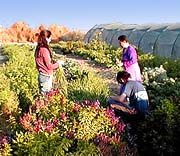What does Judaism teach about ecology?
 |
 |
 |
Fruit picking at Kibbutz Lotan in Israel |
Humanity and Creation
The Jewish attitude to nature is based on the belief that the universe is the work of the Creator. Love of God includes love of all His creations: the inanimate, plants, animals and humans. Nature in all its beauty is created for us, and our connection to nature restores us to our original state of happiness and joy.
The Bible informs us that the earth is given to man ‘to use and protect’. But the ‘dominion’ mentioned in the Bible is not the dominion of a tyrant. God’s mercy extends to all He has created, as is written, ‘the earth is founded upon mercy’.
The Sabbatical Year
This is the core conservation principle in the Bible:
Six years shall you sow your field, and six years shall you prune your vineyard, and gather in the produce thereof. But in the seventh year shall be a Sabbath of solemn rest for the land, a Sabbath unto the Lord; you shall neither sow your field nor prune your vineyard. (Leviticus 25:1-5)
According to Maimonides, one of the goals of ceasing all agricultural activity is to improve and strengthen the land. Sabbath is a return to nature. The last Sabbatical observed in Israel was in 1993-94.
Altering Creation
The Bible says we must preserve the natural balance of creation. Every species was created for some purpose and should not be interfered with.
You shall not let your cattle gender with a diverse kind; you shall not sow your field with two kinds of seed; neither shall there come upon you a garment of two kinds of stuff mingled together. (Leviticus 19:19)
Wasteful Destruction
Jewish teachings prohibit the destruction of anything from which humans may benefit. This applies to animals, plants, and even inanimate objects. Even in time of war, the Bible forbids the destruction of fruit-bearing trees. Sages compared the death of a tree to the departure of man’s soul from his body:
‘When people cut down the wood of a tree that yields fruit, its cry goes from one end of the world to the other, and the sound is inaudible... When the soul departs from the body, the cry goes forth from one end of the world to the other, and the sound is inaudible.’
Based on the Windsor Statements. The Jewish statement was compiled by Professor Nahum Rakover
Links
* Link here for the The Big Green Jewish Website.
* Link here for the US Jewish group Hazon, which presents environmental messages through promoting outdoor physical challenges.
* Link here for the Shalom Center in the USA, and sign up for Rabbi Arthur Waskow's entertaining and informative newsletter on all aspects of eco-Judaism.
* Link here for the award-winning Jew and the Carrot eco blog.
* Link here for a leaflet explaining the Jewish theology of conservation in the context of protecting endangered pollinator species in urban areas.
Interfaith Jewish Eco-Links
* Link here to be inspired by the energy of FUSE (Faiths United for Sustainable Energy) run largely by and for Jews and Christians in Florida.
|

